Relevant
books
available at Amazon
Eusebius studies and translations
with links to Amazon
Several also below
TEXTS &
TRANSLATIONS
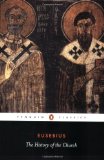 
History of the Church Andrew Louth ed. ----- 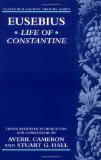 
Cameron and Hall ----- In Praise of Constantine: Historical Study and New Translation of Eusebius' Tricennial Orations (University of California publications, classical studies ; v. 15)
-----
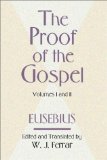 
W. J. Ferrar
-----
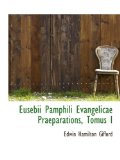 
Eusebii Pamphili Evangelicae Praeparations, Tomus I (Greek Edition)
Edwin Hamilton Gifford
-----
Eusebius, Bishop of Caesarea - the Ecclesiastical History and the Martyrs of Palestine. Two Volumes
-----
Eusebius ... On the Theophania Or Divine Manifestation of Our Lord and Saviour Jesus Christ, Tr. with Notes: To Which Is Prefixed a Vindication of the ... of That Distinguished Writer, by S. Lee
-----
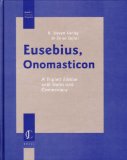 
Notley and Safrai
-----
STUDIES 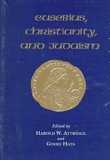 
Eusebius, Christianity and Judaism Harold W. Attridge ----- 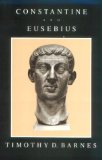 
Constantine and Eusebius Timothy Barnes ----- 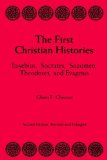 
Glenn Chesnut ----- 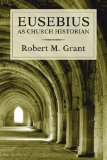 
Robert Grant ----- 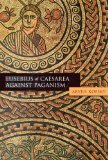 
Eusebius of Caesarea Against Paganism Aryeh Kofsky ----- Eusebius of Caesarea and the Arian Crisis
C. Luibheid ----- 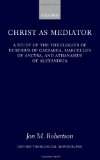 
Christ as Mediator: A Study of the Theologies of Eusebius of Caesarea,
Marcellus of Ancyra, and Athanasius of Alexandria
Jon M. Robertson
----- Eusebius of Caesarea
Wallace-Hadrill
|
CHAPTER XXIII.—The Question then agitated
concerning the Passover.
1. A QUESTION of no small importance arose at that time. For the parishes of all
Asia, as from an older tradition, held that the fourteenth day of the moon, on
which day the Jews were commanded to sacrifice the lamb, should be observed as
the feast of the Saviour’s passover. It was therefore necessary to end their
fast on that day, whatever day of the week it should happen to be. But it was
not the custom of the churches in the rest of the world to end it at this time,
as they observed the practice which, from apostolic tradition, has prevailed to
the present time, of terminating the fast on no other day than on that of the
resurrection of our Saviour. 2. Synods and assemblies of bishops were held on
this account, and all, with one consent, through mutual correspondence drew up
an ecclesiastical decree, that the mystery of the resurrection of the Lord
should be celebrated on no other but the Lord’s day, and that we should observe
the close of the paschal fast on this day only. There is still extant a writing
of those who were then assembled in Palestine, over whom Theophilus, bishop of
Cæsarea, and Narcissus, bishop of Jerusalem, presided. And there is also another
writing extant of those who were assembled at Rome to consider the same
question, which bears the name of Bishop Victor; also of the bishops in Pontus
over whom Palmas, as the oldest, presided; and of the parishes in Gaul of which
Irenæus was bishop, and of those in Osrhoëne and the cities there; and a
personal letter of Bacchylus, bishop of the church at Corinth, and of a great
many others, who uttered the same opinion and judgment, and cast the same vote.
3. And that which has been given above was their unanimous decision.
CHAPTER XXIV.—The Disagreement in Asia.
1. BUT the bishops of Asia, led by Polycrates, decided to hold to the old custom
handed down to them. He himself, in a letter which he addressed to Victor and
the church of Rome, set forth in the following words the tradition which had
come down to him: 2. “We observe the exact day; neither adding, nor taking away.
For in Asia also great lights have fallen asleep, which shall rise again on the
day of the Lord’s coming, when he shall come with glory from heaven, and shall
seek out all the saints. Among these are Philip, one of the twelve apostles, who
fell asleep in Hierapolis; and his two aged virgin daughters, and another
daughter, who lived in the Holy Spirit and now rests at Ephesus; and, moreover,
John, who was both a witness and a teacher, who reclined upon the bosom of the
Lord, and, being a priest, wore the sacerdotal plate. 3. He fell asleep at
Ephesus. 4. And Polycarp in Smyrna, who was a bishop and martyr; and Thraseas,
bishop and martyr from Eumenia, who fell asleep in Smyrna. 5. Why need I mention
the bishop and martyr Sagaris who fell asleep in Laodicea, or the blessed
Papirius, or Melito, the Eunuch who lived altogether in the Holy Spirit, and who
lies in Sardis, awaiting the episcopate from heaven, when he shall rise from the
dead? 6. All these observed the fourteenth day of the passover according to the
Gospel, deviating in no respect, but following the rule of faith. And I also,
Polycrates, the least of you all, do according to the tradition of my relatives,
some of whom I have closely followed. For seven of my relatives were bishops;
and I am the eighth. And my relatives always observed the day when the people
put away the leaven. 7. I, therefore, brethren, who have lived sixty-five years
in the Lord, and have met with the brethren throughout the world, and have gone
through every Holy Scripture, am not affrighted by terrifying words. For those
greater than I have said ‘We ought to obey God rather than man.’” 8. He then
writes of all the bishops who were present with him and thought as he did. His
words are as follows: “I could mention the bishops who were present, whom I
summoned at your desire; whose names, should I write them, would constitute a
great multitude. And they, beholding my littleness, gave their consent to the
letter, knowing that I did not bear my gray hairs in vain, but had always
governed my life by the Lord Jesus.” 9. Thereupon Victor, who presided over the
church at Rome, immediately attempted to cut off from the common unity the
parishes of all Asia, with the churches that agreed with them, as heterodox; and
he wrote letters and declared all the brethren there wholly excommunicate. 10.
But this did not please all the bishops. And they besought him to consider the
things of peace, and of neighborly unity and love. Words of theirs are extant,
sharply rebuking Victor. 11. Among them was Irenæus, who, sending letters in the
name of the brethren in Gaul over whom he presided, maintained that the mystery
of the resurrection of the Lord should be observed only on the Lord’s day. He
fittingly admonishes Victor that he should not cut off whole churches of God
which observed the tradition of an ancient custom and after many other words he
proceeds as follows: 12. “For the controversy is not only concerning the day,
but also concerning the very manner of the fast. For some think that they should
fast one day, others two, yet others more; some, moreover, count their day as
consisting of forty hours day and night. 13. And this variety in its observance
has not originated in our time; but long before in that of our ancestors. It is
likely that they did not hold to strict accuracy, and thus formed a custom for
their posterity according to their own simplicity and peculiar mode. Yet all of
these lived none the less in peace, and we also live in peace with one another;
and the disagreement in regard to the fast confirms the agreement in the faith.”
14. He adds to this the following account, which I may properly insert: “Among
these were the presbyters before Soter, who presided over the church which thou
now rulest. We mean Anicetus, and Pius, and Hyginus, and Telesphorus, and Xystus.
They neither observed it themselves, nor did they permit those after them to do
so. And yet though not observing it, they were none the less at peace with those
who came to them from the parishes in which it was observed; although this
observance was more opposed to those who did not observe it. 15. But none were
ever cast out on account of this form; but the presbyters before thee who did
not observe it, sent the eucharist to those of other parishes who observed it.
16. And when the blessed Polycarp was at Rome in the time of Anicetus, and they
disagreed a little about certain other things, they immediately made peace with
one another, not caring to quarrel over this matter. For neither could Anicetus
persuade Polycarp not to observe what he had always observed with John the
disciple of our Lord, and the other apostles with whom he had associated;
neither could Polycarp persuade Anicetus to observe it as he said that he ought
to follow the customs of the presbyters that had preceded him. 17. But though
matters were in this shape, they communed together, and Anicetus conceded the
administration of the eucharist in the church to Polycarp, manifestly as a mark
of respect. And they parted from each other in peace, both those who observed,
and those who did not, maintaining the peace of the whole church.” 18. Thus
Irenæus, who truly was well named, became a peacemaker in this matter, exhorting
and negotiating in this way in behalf of the peace of the churches. And he
conferred by letter about this mooted question, not only with Victor, but also
with most of the other rulers of the churches.
CHAPTER XXV.—How All came to an Agreement respecting the Passover.
1. THOSE in Palestine whom we have recently mentioned, Narcissus and Theophilus,
and with them Cassius, bishop of the church of Tyre, and Clarus of the church of
Ptolemais, and those who met with them, having stated many things respecting the
tradition concerning the passover which had come to them in succession from the
apostles, at the close of their writing add these words: 2. “Endeavor to send
copies of our letter to every church, that we may not furnish occasion to those
who easily deceive their souls. We show you indeed that also in Alexandria they
keep it on the same day that we do. For letters are carried from us to them and
from them to us, so that in the same manner and at the same time we keep the
sacred day.”
|

